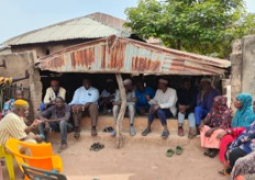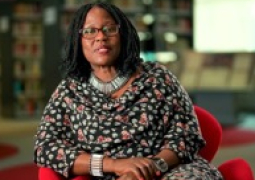Women participation in the decision process is seen to be low despite constituting the huge chunk of the country’s population. This has even raised concern among gender activists with regards to low participation of women in the parliamentary elections.
In this special edition, we sample the opinion of people with regards to low participation of women in politics.
Lawkadinch Silvia Gomez, an activist and peace advocate explained that it’s easy to say you must be a Gambian to represent Gambia at Parliament and that they say the same for representing women at the parliament.
She stated that every conscious mind in the country looks at the equal representation of women in such places like the executive and the parliament. “It’s quite important to not only say you’ve included women but to ensure that the structures are in place to support women representation.”
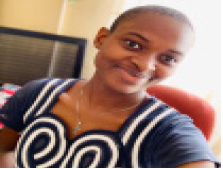
"We have failed as a nation to ensure we have a good number of women at parliament. It makes it difficult as women’s right advocates and human rights activists to push different agendas that will ensure the security, empowerment and equal participation of women. I am not saying that men at the parliament now cannot push for this to happen, but how much interest do they have in these topics and how well do they know the concerns of women and how to solve them. Imagine giving a solution to a problem you do not know of, it’s best for the person affected to represent themselves."
She believes that ‘if the country is truly in for change we won’t ignore the many competent women who will add value to our country.’
Political parties, she added, should ensure that they nominate more women for elections. “If political parties continuously fail to nominate women compared to men in the different constituencies, then we are sure they won’t encourage the equal representation in Parliament.”
"So like the Minister of Women cannot be a male; the Minister of Youths and Sports cannot be out of the youth range. So too the parliamentarians must have a good number of women to speak and be heard and to discuss and convince and argue over what won't favor the women in their different constituencies and the nation at large."
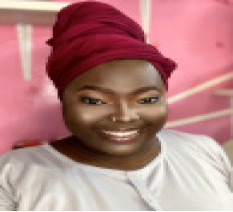 Fatoumata Sanneh, Founder and Executive Director Fateemah's Pad Drive and Gender and Period Activist said the current National Assembly Election is clear evidence that their voices as women didn't matter, even after years of advocacy.
Fatoumata Sanneh, Founder and Executive Director Fateemah's Pad Drive and Gender and Period Activist said the current National Assembly Election is clear evidence that their voices as women didn't matter, even after years of advocacy.
"For years Gambian women have been bombarded about women empowerment, but where is the empowerment if we went from 6 female representatives in the National Assembly to drop to 3 elected representatives out of 19 nominated women. There’s no women leadership and we are not represented at the decision making table."
She had expressed hope that President Barrow considered that minorities are women when nominating the five National Assembly Members to nominate more women, but that it’s unfortunate that they are under-represented.
"Women represent 51% of our Gambian population and having 6% to represent us in the National Assembly is not encouraging, not for development, not for gender equality. Being a gender activist and a period activist, it’s devastating to see that my hope for gender equality and ending period poverty is far to reach because of low representation in the NAM."
She concluded by making reference to the results of the just concluded election, which she said, does not promote gender equality and women's participation in decision-making.
Lala Touray, a women’s activist believes that there is a very fundamental problem with female representation in political leadership across all levels of their political landscape. She noted that women continue to be under-representation despite their valuable contributions in both political and electoral processes.
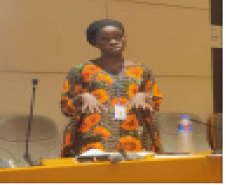
"The recently concluded National Assembly election is a clear manifestation of the need to ensure the continued advocacy and engagement with relevant stakeholders to promote democratic reforms and strengthen female political representation."
Miss Touray lamented that it is very discouraging that decades after the independence, they are still having these conversations and dialogue to give women leadership spaces; the same political spaces of which women are the driving force.
"Five out of 58 seats in parliament occupied by women in parliament is evidence of a fundamental national problem, which must be addressed as a part of our quest to solidify our democracy." she concluded.
Rohey Jadama, a trainee at the Directorate of Social Welfare, Ministry of Gender, Children Welfare, expressed disappointment over the issue, lamenting that it is very disappointing to see out of nineteen women that contested for in this year’s parliamentary election, only three were elected.
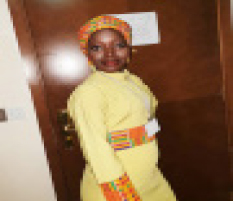 "As we speak we have five women at the parliament out of 58 seats. According to the Gambia Bureau of Statistics, women constitute 51% of the country’s population. Also, when it comes to the total number of registered voters from last year’s voter registration of the Independent Electoral Commission (IEC), women constitute 56.7%. However, this numerical strength does not reflect in the number of women elected."
"As we speak we have five women at the parliament out of 58 seats. According to the Gambia Bureau of Statistics, women constitute 51% of the country’s population. Also, when it comes to the total number of registered voters from last year’s voter registration of the Independent Electoral Commission (IEC), women constitute 56.7%. However, this numerical strength does not reflect in the number of women elected."
She highlighted that it is about time they support each other as women and refuse to be cheerleaders, mobilisers and campaigners for male candidates.
While expressing her frustration, Rohey acknowledged that The Gambia would not develop if half of its population is left behind. “The low representation of women is attributed to the fact that they live in a patriarchal society. Women continue to face discrimination, stereotypes and stigma when they vie for political office. Society questions their personal lives, their marital status, failed relationships and other issues not related to their competence and the position they are vying for. "
She thus urged Civil society organisations and government to raise more awareness on the need for electorates to vote for women candidates, saying the new National Assembly members should also reintroduce the Constitutional Amendment Bill 2021 which seeks to reserve 16 seats for women in parliament.
Low women representation especially in elective positions has a long historical background. From independence, very few women were able to find their way through leadership especially in elective position. The numerous cultural and social barriers as well as the ensuing marginalisation, in fact, expose women to oppression, exploitation, vulnerability despite being the majority in demography.
Fatoumatta Camara, program office for Peace Hub said the just ended parliamentary election has yet again proven that attaining Women Leadership is a dream farfetched.
She expressed dismay over the low number of women representatives that won out of nineteen, who contested seats.
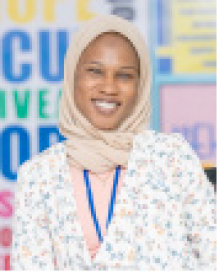 "There is still more work to be done to achieve at least 30% representation. Being a peace advocate and inclusion of women in decision making process enthusiast, I must say we cannot have a just society if one part of the society is left behind. National Assembly is the highest decision making body in terms of legislations. Interestingly, it is not the only machinery that women representation is low, the executive is also screaming foul of our low representation. We are only given soft positions to minister, linking it to our maternal instinct of caring."
"There is still more work to be done to achieve at least 30% representation. Being a peace advocate and inclusion of women in decision making process enthusiast, I must say we cannot have a just society if one part of the society is left behind. National Assembly is the highest decision making body in terms of legislations. Interestingly, it is not the only machinery that women representation is low, the executive is also screaming foul of our low representation. We are only given soft positions to minister, linking it to our maternal instinct of caring."
Miss Camara indicated that they cannot have sustainable development without including women. Understanding that politics is male dominated in the world, however, she thinks it’s high time women are also given the opportunity to lead, lamenting that it has to start from the grassroots.
"If women are given the opportunities of representation, they will see that women have evolved from household to socio political leadership, that time has changed and facts have revealed that women are examples of empowered beings who are well awakened of their rights and responsibilities. There are so many testimonies on how women are courageous, confident and independent in raising their voices against all social evils and gender injustices. If we must have a well-balanced gender society, we must include the voices women in our decision making process."


